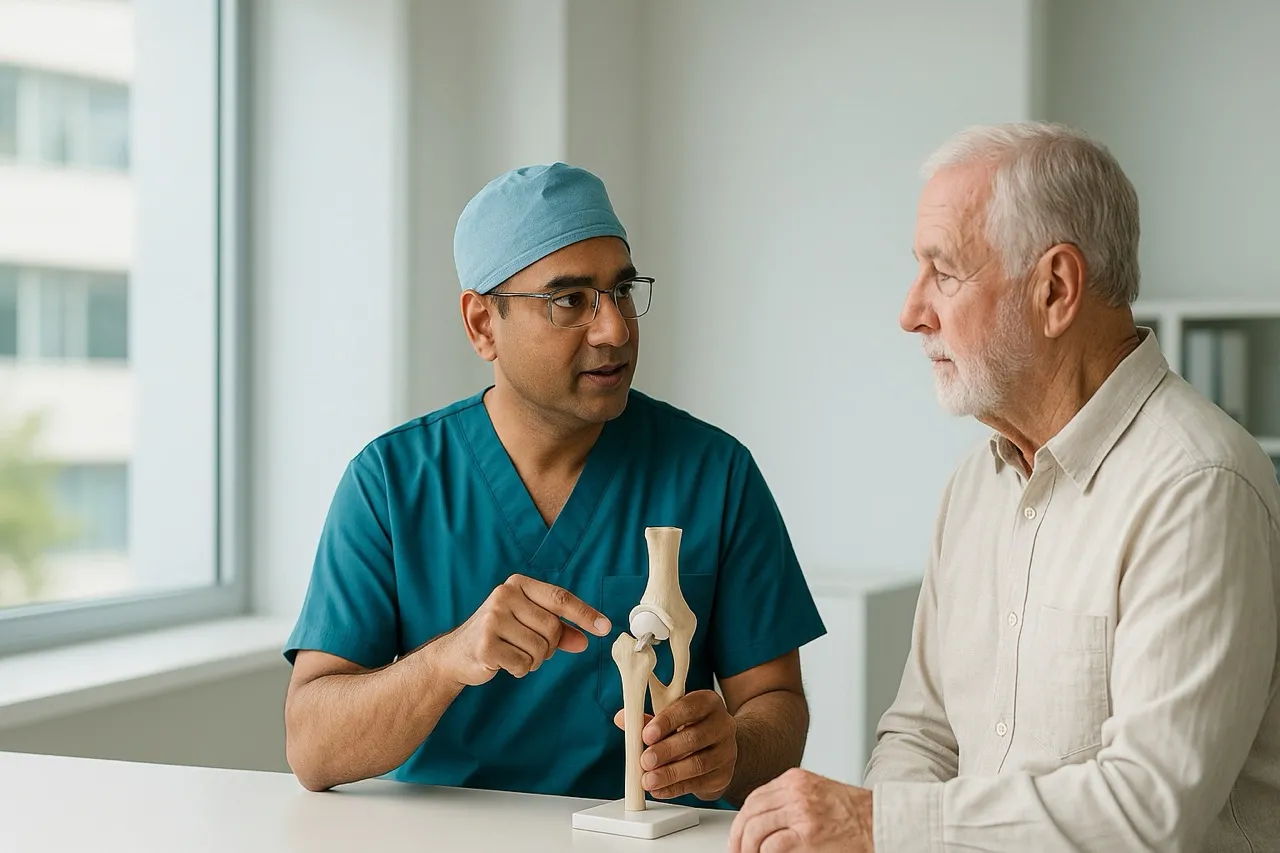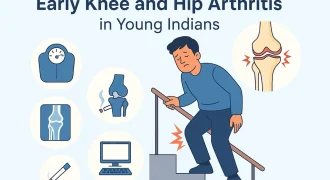Table of Contents
When you hear the words hip replacement or knee replacement, the first thought that comes to mind is often the same: “How Long does hip & Knee Replacement Surgery and recovery take?”
How long will the surgery last? How long will I be in the hospital? How long will it take before I can walk again? These questions are natural. Surgery can feel overwhelming. But when you break it down step by step, it becomes easier to understand and prepare for.
As an orthopedic specialist, Dr. Divya Ahuja meets patients every day who ask exactly these questions. In this guide, we’ll walk through surgery times, hospital recovery, long-term healing, and what life looks like after hip and knee replacements.
Think of this blog as a timeline roadmap. By the end, you’ll know what to expect and why recovery is not just about surgery, but about steady progress, patience, and teamwork with your doctor and physiotherapist.
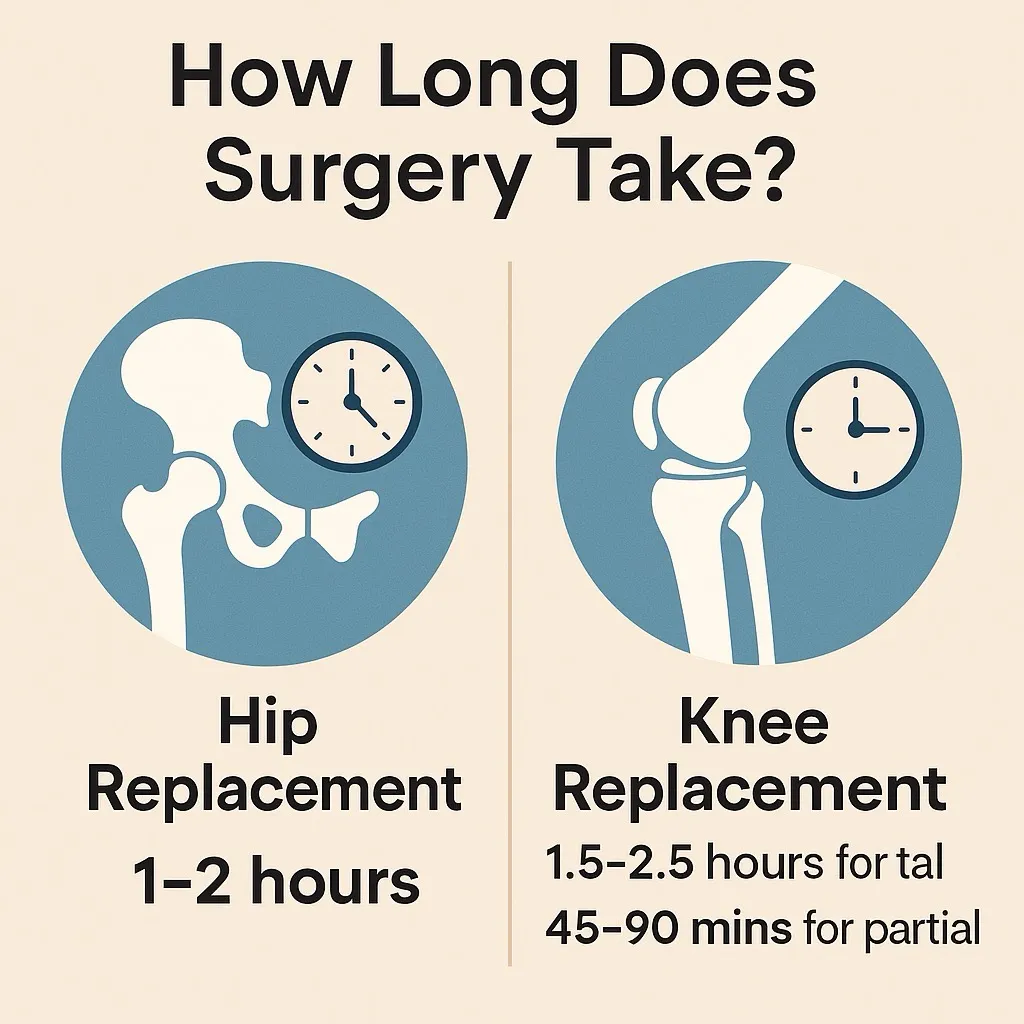
How Long Does Hip Replacement Surgery Take?
A hip replacement surgery usually takes 1 to 2 hours.
That might surprise you. For such a major procedure, it sounds short. But orthopedic teams are highly trained, and modern surgical methods make the process efficient.
Here’s what goes into those two hours:
- Preparation and anesthesia. Before surgery begins, doctors administer anesthesia and prepare the surgical site. This alone takes 30–40 minutes.
- The procedure itself. Damaged parts of the hip joint are removed. A prosthetic joint, often made of titanium, ceramic, or high-grade plastic, is placed.
- Closure and stabilization. The incision is stitched or stapled. A dressing is applied. Monitoring begins.
Analogy: Think of it like replacing a broken hinge on a door. The actual unscrewing and fitting may not take long. But you spend extra time making sure the new hinge aligns perfectly, so the door swings smoothly for years.
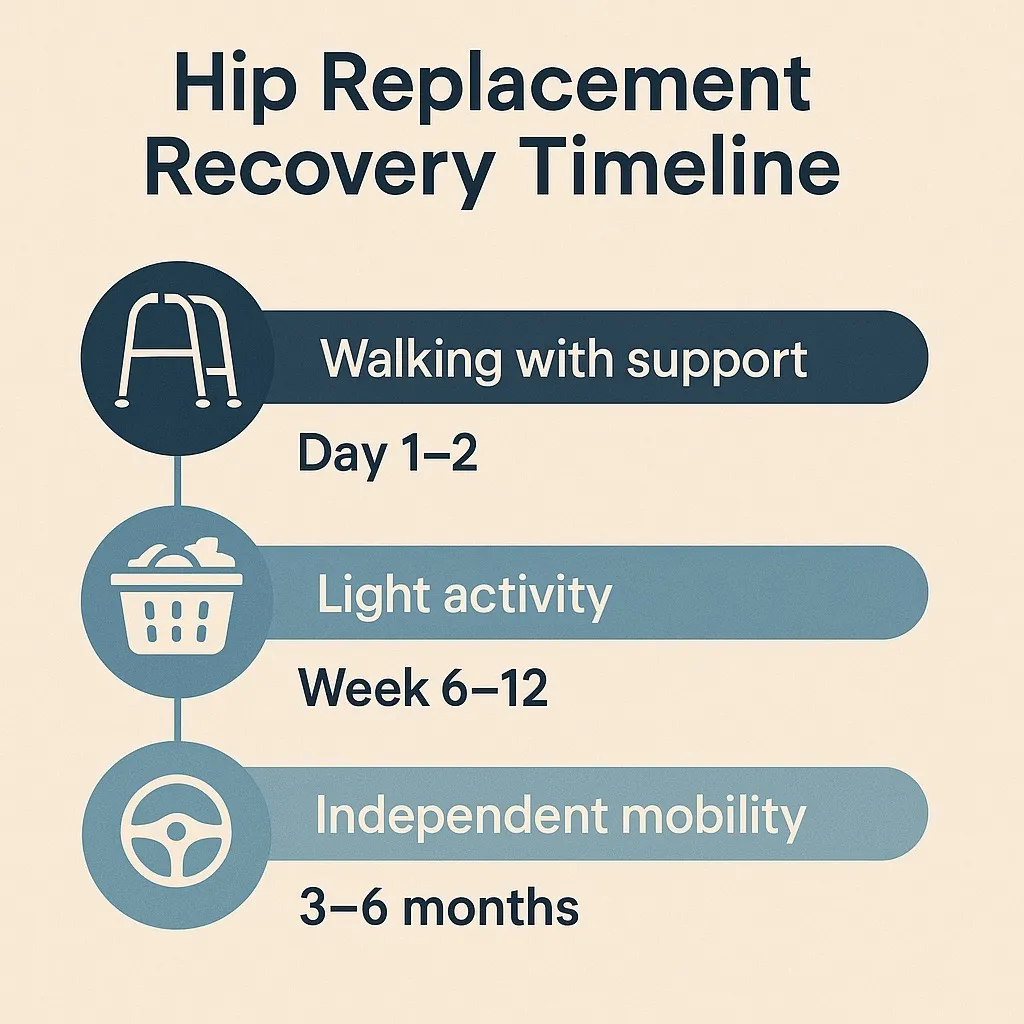
How Long Does Knee Replacement Surgery Take?
Knee replacement surgery is similar in length, but it varies based on the type:
- Total Knee Replacement (TKR): Usually takes 1.5 to 2.5 hours.
- Partial Knee Replacement: Often just 45 to 90 minutes.
Why the difference? In a partial replacement, only the damaged section of the knee is replaced. In a total replacement, the surgeon reshapes the ends of the thigh bone and shin bone and fits the entire joint with implants.
Robotic-assisted surgeries may take slightly longer during setup. But they offer precision that can improve implant placement.
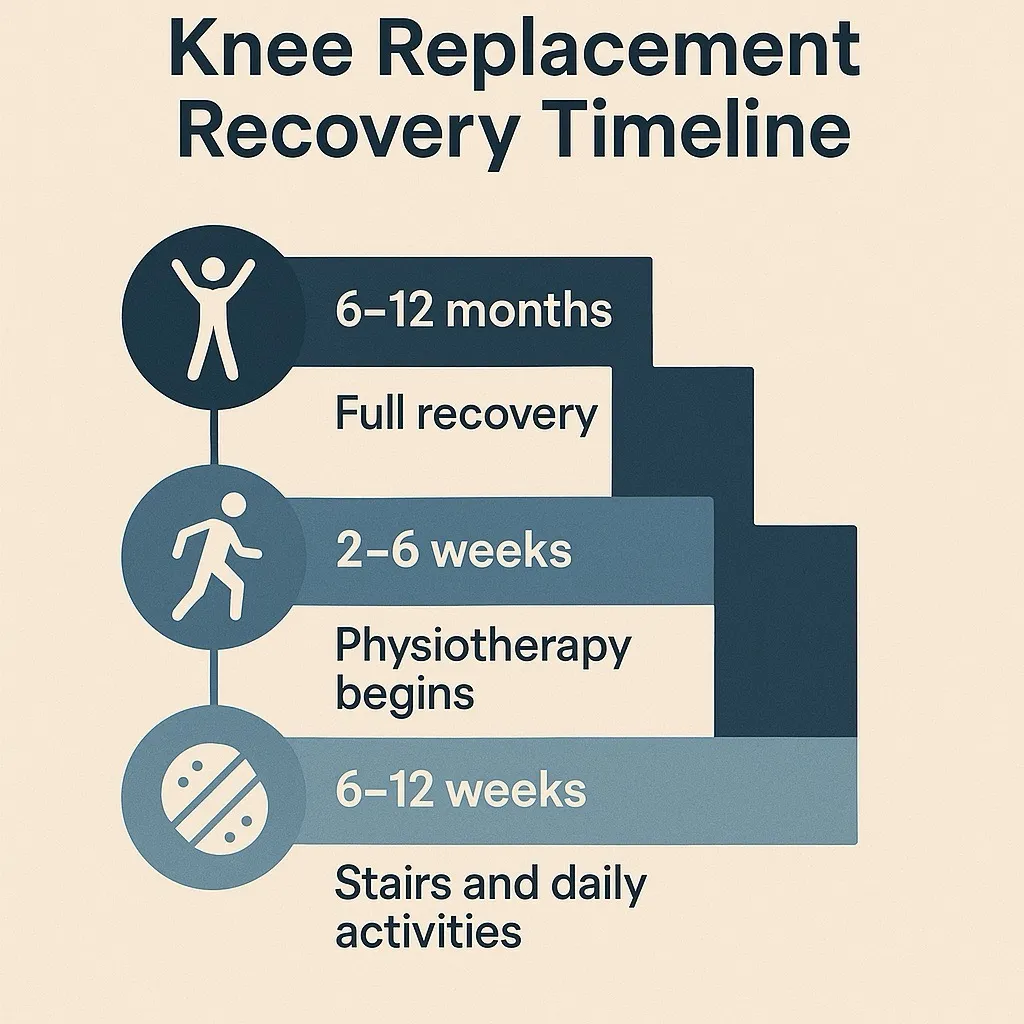
What Happens Immediately After Surgery?
The first 24–48 hours are about stabilization and pain management.
- You’ll wake up in a recovery ward or ICU.
- Nurses will monitor your heart rate, oxygen levels, and wound site.
- Pain medication is given to keep you comfortable.
Most patients are encouraged to stand or walk with support within a day or two. It sounds fast, but early movement prevents blood clots and kickstarts recovery.
Hospital stay is usually 3 to 5 days, depending on your overall health and progress.
Hip Replacement Recovery Timeline
Recovery from hip replacement doesn’t happen overnight. It’s a gradual journey.
Weeks 0–2:
- Pain and swelling are common.
- Walking aids like walkers or canes are essential.
- Basic movements like sitting, standing, and walking short distances are re-learned.
Weeks 2–6:
- Muscle strength improves.
- You’ll walk more independently, sometimes with a cane.
- Light household activities become possible.
Weeks 6–12:
- Many patients can drive again and return to low-impact activities.
- The joint feels more natural.
3–6 months:
- Full recovery for most patients.
- Daily activities feel normal.
Special note for 60-year-olds:
At this age, healing may take a little longer. Bones are not as strong, muscles take more effort to rebuild, and balance may be different. But with dedicated physiotherapy, outcomes are excellent. Many 60+ patients return to active lifestyles like gardening, walking, and even golf.
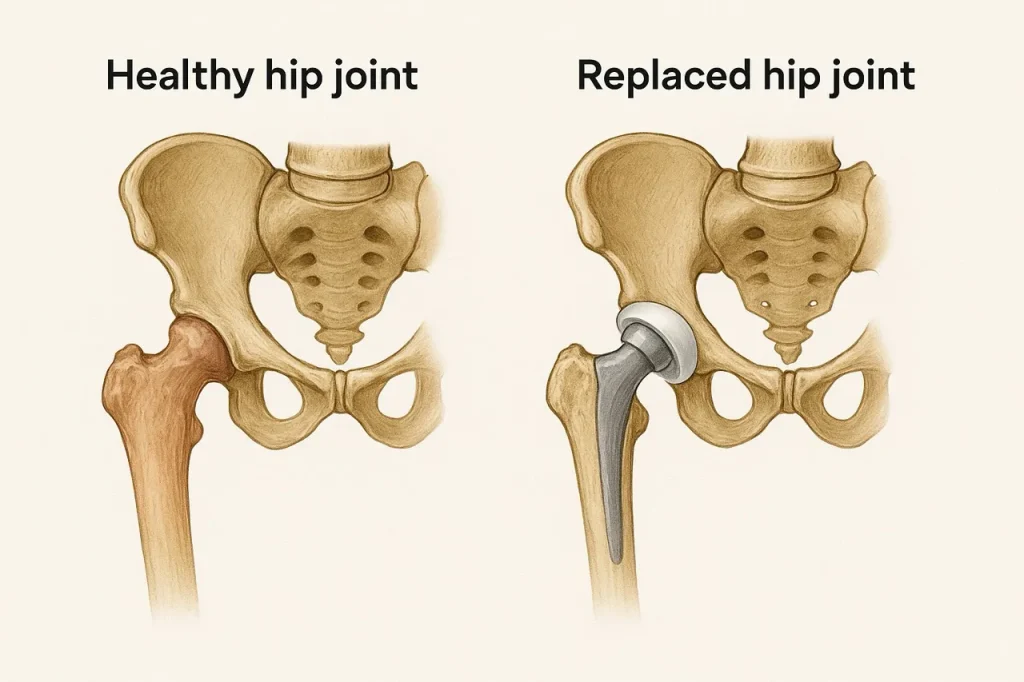
Knee Replacement Recovery Timeline
Knee recovery has its own pace.
Weeks 0–2:
- Focus on wound healing.
- Pain and stiffness are high, but manageable with therapy.
Weeks 2–6:
- Physiotherapy becomes central.
- Patients learn to bend and straighten the knee gradually.
- Walking aids are still needed.
Weeks 6–12:
- Many people can resume most normal activities, including stair climbing.
- Pain reduces significantly.
6 months+:
- Most patients report normal function.
- For some, it may take up to 12 months for full recovery, especially after total knee replacement.
Rehabilitation and Physiotherapy
If surgery is the engine, physiotherapy is the fuel.
Without physiotherapy, recovery stalls. With it, mobility improves faster and implants last longer.
- Early days: Gentle exercises to reduce stiffness.
- Weeks 2–6: Supervised sessions to improve flexibility and balance.
- Months 3–6: Strength training to restore muscles around the joint.
Skipping therapy is like buying a car and never changing the oil. The new joint might work, but not at its full potential.
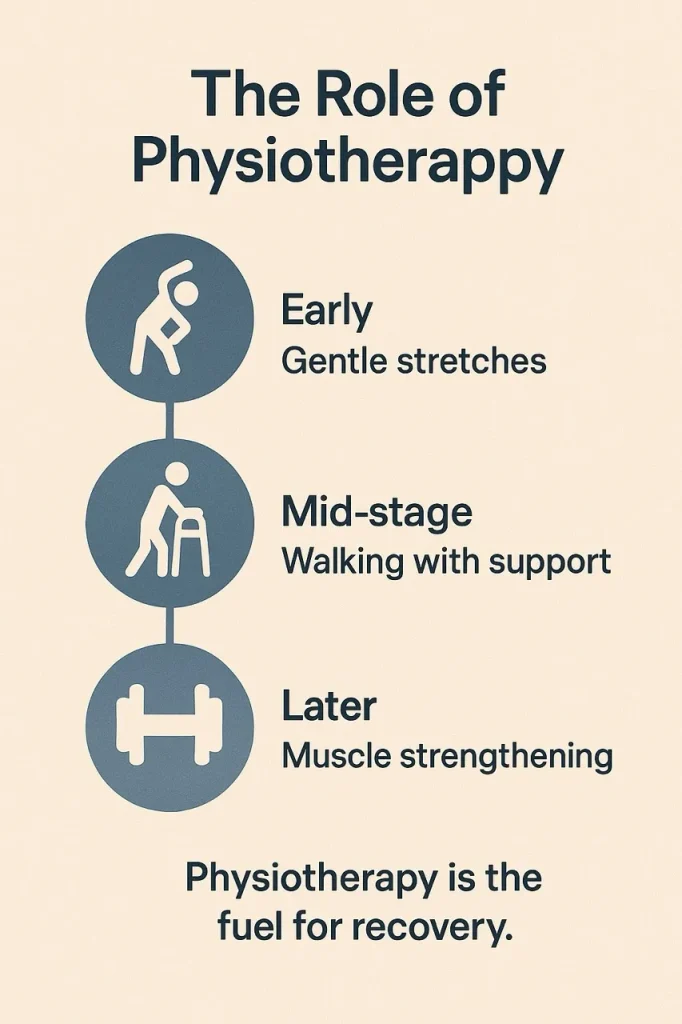
How Long Do Hip and Knee Replacements Last?
This is one of the most common questions. The short answer: 15 to 25 years.
- Hip replacements: Typically last 15–20 years.
- Knee replacements: Often last 15–25 years.
- Titanium implants: Known for durability, many last longer than 20 years.
Your lifestyle matters. A patient who maintains a healthy weight and avoids high-impact sports may see their implant last decades.
Analogy: It’s like tires on a car. Drive smoothly, rotate them regularly, and they’ll last longer. Drive aggressively, and they wear out faster.
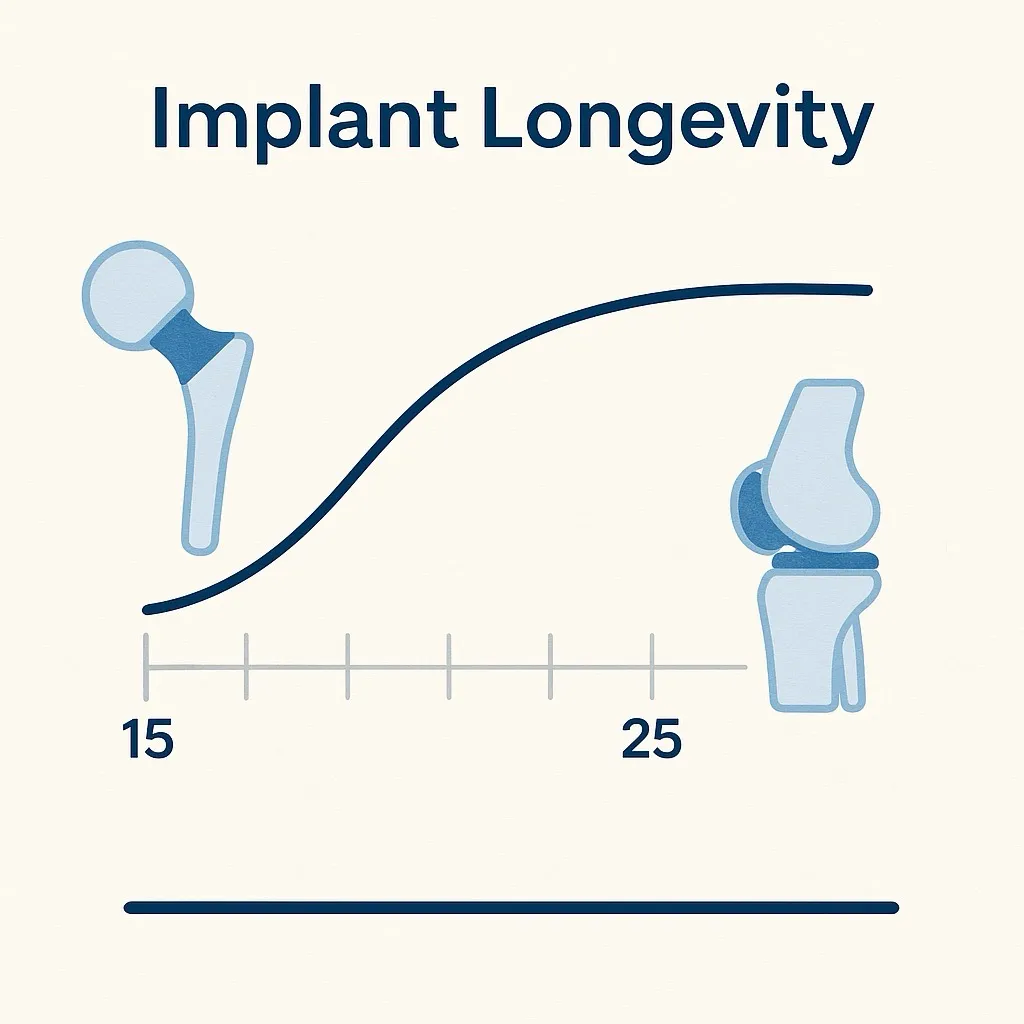
Why Choosing the Right Surgeon Matters
Every patient is unique. The same timeline may feel different for two people with different health backgrounds. That’s why having an experienced orthopedic surgeon matters.
Dr. Divya Ahuja specializes in hip and knee replacement surgeries and has guided patients of all ages through successful recoveries. From Ilizarov surgery planning to physiotherapy, having the right expert makes the journey smoother and more reassuring.
If you live in Maharashtra, consulting Dr. Ahuja ensures care tailored to your lifestyle, health needs, and personal goals.
Conclusion
Hip and knee replacements are not just about surgery time. They are about the life you get back afterward.
Yes, surgery may take only a couple of hours. Yes, recovery may stretch over weeks and months. But in the end, most patients say the same thing: “It was worth it.”
Walking without pain. Climbing stairs with confidence. Playing with grandchildren. Getting back to gardening. These are the milestones that make the process meaningful.
If you or a loved one are considering hip or knee replacement, remember this: it’s not just about how long the surgery takes. It’s about how much better life feels afterward.
Our Clinical Locations
Tap a location to view timings, contact, and map.
Broadway Healthcare, Dadar East
Broadway Healthcare, Dadar East
Clinic Info
- 📍 Broadway Healthcare, Dadar East, Mumbai
- 🕒 Wednesdays · 10:00 AM – 12:00 NOON
- 📞 Appointments: +91 93213 17227
Sweet Clinics, Vashi, Navi Mumbai
Sweet Clinics, Vashi, Navi Mumbai
Clinic Info
- 📍 Sweet Clinics, Vashi, Navi Mumbai
- 🕒 Fridays · 10:00 AM – 12:00 NOON
- 📞 Appointments: +91 93213 17227
Heal Well Speciality Clinic, Thane West
Heal Well Speciality Clinic, Thane West
Clinic & OPD Info
- 📍 Heal Well Speciality Clinic, Thane West
- 🕒 Every Wednesday 10:00 AM – 11:00 AM
- 📞 Appointments: +91 81691 04438
Mangal Anand Hospital, Chembur Mumbai
Mangal Anand Hospital, Chembur Mumbai
Clinic & OPD Info
- 📍 Mangal Anand Hospital, Chembur Mumbai
- 🕒 Monday, Wednesday, Friday 03-07 PM, Thursday 06-07 PM, Free OPD Saturday 02-04 PM
- 📞 Appointments: +91 70212 18182
SRV Hospitals, Tilaknagar, Chembur
SRV Hospitals, Tilaknagar, Chembur
Clinic Info
- 📍 SRV Hospitals, Tilaknagar, Chembur
- 🕒 Monday, Wednesday, Friday 11 AM-12 PM
- 📞 Appointments: +91 84518 00800
FAQs
How long does a hip replacement surgery usually take?
A hip replacement typically takes 1 to 2 hours. This includes removing the damaged joint, placing the implant, and closing the incision. Factors like the surgical method and patient’s health can make it slightly shorter or longer.
What is the recovery time after hip replacement surgery for a 60-year-old?
For most 60-year-olds, recovery takes 3 to 6 months. Many can walk with support within weeks and return to light daily activities by 2–3 months. Full strength and flexibility improve gradually with physiotherapy.
How many weeks does it take to walk normally after knee replacement?
Patients usually walk more comfortably in 6 to 12 weeks. At first, walking aids are needed, but with consistent physiotherapy, many regain independence by the third month.
How long do hip and knee replacement implants last?
Modern implants often last 15 to 25 years. Titanium and ceramic designs are especially durable. A healthy lifestyle, regular check-ups, and avoiding high-impact activities can extend their lifespan.
What is the difference in recovery time between partial and total knee replacement?
A partial knee replacement heals faster, often in 4 to 6 weeks. A total knee replacement needs more time, usually 3 to 6 months, for patients to feel fully recovered.
How long do I need physiotherapy after hip or knee replacement?
Most patients need structured physiotherapy for 6 to 12 weeks. Ongoing home exercises for several months help improve strength, balance, and flexibility.
How soon can I drive after hip or knee replacement surgery?
Driving is usually possible after 4 to 6 weeks, once you’re off heavy pain medication and can move your leg comfortably to brake and accelerate.
What are the biggest factors that affect hip and knee replacement recovery time?
Recovery depends on age, overall health, body weight, and commitment to physiotherapy. Patients who stay active, eat well, and follow rehab plans recover faster.
How long will I stay in the hospital after joint replacement surgery?
The average hospital stay is 3 to 5 days. Some patients with good support at home may go home sooner, while others may need longer care if complications arise.
Is hip or knee replacement recovery harder for older adults?
Older adults may take longer to heal, especially with weaker muscles or other health conditions. But with guided physiotherapy, most regain good mobility and quality of life.
